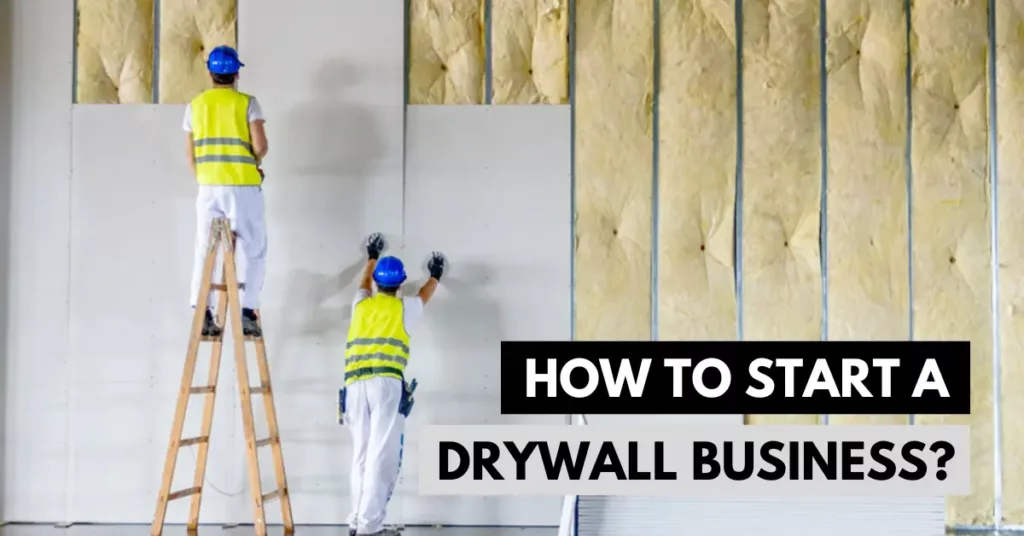How to start a drywall business effectively? What are the key challenges and considerations involved in starting a drywall business? You can establish a successful drywall business in this thriving industry with dedication, professionalism, and a commitment to delivering high-quality work and exceptional customer service.
Starting a drywall contracting business can be lucrative if you have experience in the construction industry and desire to run your own business. Before diving into this field, gaining hands-on experience in drywall installation and related tasks within the construction industry is crucial.
This experience will give you a solid foundation and understanding of the trade. Additionally, contact your local licensing board or department to inquire about the specific requirements for obtaining a drywall contractor license and permit in your state. Each state has its regulations and procedures that must be followed.
How to Start a Drywall Business?
Making your ambition of starting a small business a prosperous reality requires planning and preparation.
Here are nine stages to help you launch a plasterboard business in the US, from market research to why you might want to consider plasterboard business insurance.
1. Do Your Research
Understanding the local market is crucial when shaping a business idea, such as a drywall business. Conducting thorough research can help make informed decisions regarding the services offered, pricing, and advertising strategies. Here are some points:
Investigate the need for drywall installation in your target market or the geographical area where you plan to operate.
Identify and study existing drywall businesses in your area. Examine the services they provide, their pricing structure, and their marketing strategies.
Understand your business’s risks to develop a comprehensive risk management plan. Identify potential risks such as workplace injuries, accidents, lawsuits, equipment failure, or property damage.
2. Write a Business Plan
Writing a thorough and creative business plan is essential for each entrepreneur since it acts as a roadmap for achieving their endeavor. Typical basic components of a business plan for a plasterboard company include the following:
Clearly define the intended legal structure of your drywall business, whether it be a sole proprietorship, partnership, corporation, or any other appropriate entity.
Analyze the competitive landscape to identify key competitors, their strengths and weaknesses, and strategies to differentiate your business.
Develop realistic sales forecasts based on market analysis, target customer segments, pricing strategies, and projected growth.
These forecasts should outline anticipated revenue streams and sales targets for specific timeframes, aiding in financial planning and performance evaluation.
3. Apply for Licenses and Permits
Complying with the necessary licenses and permits is essential when establishing a business or engaging in certain professional activities.
Specific permits may be necessary for individual projects. To ensure adherence to local regulations, it is advisable to consult your state and local governments regarding the specific license and permit requirements applicable in your area.
4. Find Funding
When starting an installation and drywall repair business, securing funding from external sources can be crucial for covering initial expenses such as equipment purchases, staffing, and operational costs until the business becomes profitable.
Here are some common sources of funding for small businesses. Banks and financial institutions often provide loans to small businesses.
Grants can be offered by various entities, including state and local governments as well as private institutions. These grants are typically awarded based on specific criteria, such as the nature of your business and its potential impact on the community.
Individuals or businesses that believe in the potential of your installation and drywall repair business may be willing to invest capital in exchange for equity or a share of the profits.
5. Hire Experienced Staff
To expand your drywall business and maintain a strong reputation, consider hiring experienced staff who can provide valuable support. Here are some potential roles you may want to consider:
Skilled drywall contractors with a proven track record can contribute to delivering high-quality quality, ensuring customer satisfaction, and upholding your business’s standards.
Hiring knowledgeable salespeople can help generate leads, attract new clients, and secure contracts for your drywall services. They can effectively communicate your business’s value proposition and close deals.
An organized and efficient office manager or administrative assistant can streamline operations, handle paperwork, manage schedules, and assist with day-to-day tasks, allowing you to focus on core business activities.
6. Develop Strong Supplier Relationships
Building solid relationships with suppliers is crucial in the construction industry, as it fosters beneficial partnerships and enhances overall business performance.
By cultivating these connections, not only can you provide better value to your customers, but you can also positively impact your bottom line.
Developing strong supplier relationships offers several advantages, which can ultimately increase profitability.
7. Marketing Plan for Drywalling Business
The marketing plan for a drywalling business aims to position as the go-to experts in the industry, providing high-quality drywall installation and repair services. You will focus on a multi-channel approach to reach the target market effectively.
Identify the target market for your drywalling services, including residential and commercial clients. Establish a professional website showcasing your drywalling services with completed project portfolios, client endorsements, and contact details.
Improve your website’s search engine optimization (SEO) by including pertinent keywords, meta descriptions, and quality content.
Assure a flawless user experience by making your website mobile-friendly and optimized. Create a presence on well-known social networking sites like LinkedIn, Facebook, and Instagram.
Regularly post engaging content related to drywalling tips, project showcases, and industry news. Explore local advertising options such as newspapers, magazines, radio, or TV ads depending on your target market.
8. Make Customer Service a Priority
Ensuring excellent customer service is vital for the success of your drywall contracting business. It begins when a customer contacts you and extends throughout the project. Here are key aspects to prioritize:
Respond promptly to current and potential customers’ inquiries, calls, emails, and messages. By addressing their concerns promptly, you demonstrate your commitment to their needs.
Provide precise and transparent quotes for your services. Consider enhancing your skills through a drywall estimating course, enabling you to deliver accurate estimates, avoid surprises, and build customer trust.
Project a professional image by wearing clean uniforms or appropriate attire while on the job. Minimize cell phone usage during work to focus on the task at hand. Additionally, ensure you clean up the work site before leaving, leaving it tidy and presentable.
Check their satisfaction with the work and address any concerns or flaws promptly. Correcting mistakes promptly demonstrates your commitment to quality and customer satisfaction.
By prioritizing these aspects of customer service, you’ll foster happy and loyal customers, ultimately contributing to the success and reputation of your drywall contracting business.
9. Consider Drywall Business Insurance
Starting a drywall business requires dedication and hard work, and it is essential to secure appropriate business insurance to safeguard your venture’s growth and success.
Before beginning a business transaction, clients or commercial space lessors may frequently demand confirmation of general liability insurance.
Another essential insurance policy to consider is Workers’ Compensation. This coverage safeguards your business by covering medical expenses and potential lawsuits arising from workplace injuries or illnesses sustained by your employees.
How to Start a Small Drywall Business?
Starting a small drywall business requires careful planning and execution. Begin by conducting market research to assess demand and competition in your target area. Purchase or lease the essential tools and equipment, ensuring high quality.
Build a network of reliable suppliers and subcontractors, and establish partnerships with local construction companies. Invest in marketing efforts to raise awareness of your services, such as creating a professional website.
Lastly, deliver exceptional customer service and maintain high standards of artistry to build a strong reputation and secure repeat business.
What are the Pros and Cons of the Drywall Business?
Pros
1. High Demand
The construction industry consistently requires drywall services, making it a stable and in-demand market. As long as new construction, renovation, or repair work is happening, there will be a need for skilled drywall professionals.
2. Profit Potential
Drywall projects can be profitable, especially when establishing efficient workflows and maintaining good supplier relationships.
You can generate healthy profit margins with effective project management, accurate pricing, and cost control.
3. Growth Opportunities
As your reputation and client base grow, you can expand your business by offering additional services related to drywall, such as insulation installation, ceiling installation, or acoustic treatments. This diversification can lead to increased revenue and business growth.
Cons
1. Seasonal Fluctuations
The construction industry often experiences seasonal variations in demand, which can impact the flow of projects.
Adjusting your business strategy, managing cash flow effectively, and exploring alternative revenue streams to mitigate potential downturns may be necessary during slower periods.
2. Competitive Market
The drywall industry can be competitive, with numerous established companies and contractors vying for projects. Differentiating your business and building a strong reputation may require considerable effort and marketing strategies to stand out.
3. Physical Demands
Drywall work involves physical labor, which can be physically demanding and potentially hazardous.
Proper safety measures, training, and investing in personal protective equipment are crucial to minimize such risks and protect your workers and yourself.
Final Verdict
In short, starting a drywall business requires skills, knowledge, planning, and strategic execution. We have discussed in detail how to start a drywall business and what steps are required to make it a success.
You need to keep these things in mind if you want to earn profit from this niche. In case of any confusion, refer to the section above and clear your confusion.
Frequently Asked Questions (FAQs)
Q: How much does it cost to start a drywall business?
A: Startup costs vary based on location, scale of operations, equipment needs, and licensing fees. It is crucial to create a detailed budget to estimate your specific costs. Normal costs are $1.50 – $3.50 per square foot installed, $580 – $1,800 to drywall 12′ x 12′ bedroom, $8,000 – $30,000 to drywall 2,000 square foot house.
Q: How can I find clients for my drywall business?
A: Networking within the construction industry, establishing relationships with contractors and builders, and implementing effective marketing strategies (online presence, advertising, referrals) can help you find clients.
Q: What insurance do I need for my drywall business?A: General liability and workers’ compensation insurance are essential for a drywall business. Consult with an insurance professional to determine the specific coverage needed in your area.



